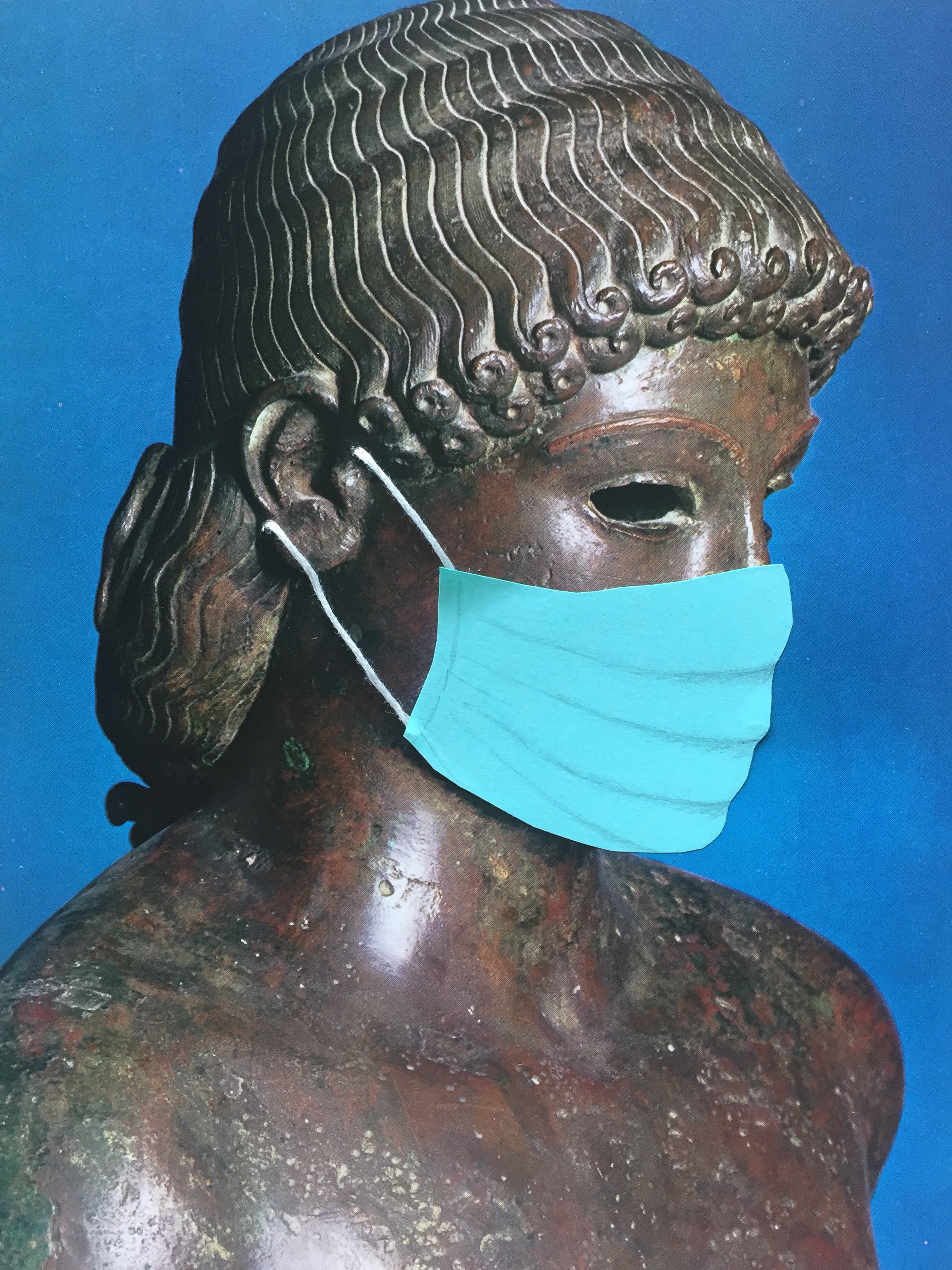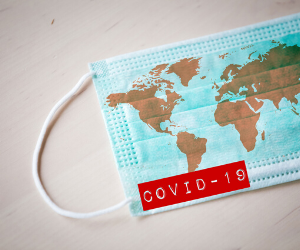On April 1, 2020, Dr. Murray Stein, internationally known Jungian analyst and author, was interviewed by Dr. Robert Henderson on the subject of the coronavirus found here. In the interest of exploring further the powerful images and ideas found in this seminal interview, Pacifica will offer a series of new interviews with Murray, designed to address the pandemic from a depth perspective. In this first interview, Murray will be interviewed by Dr. Pat Katsky, a Jungian analyst, Pacifica faculty member, and former Pacifica provost.
Read More
Posted in:
Current Affairs,
Trauma,
pandemic,
world issues
A guest post by Mary A. Wood, Co-Chair, Engaged Humanities and the Creative Life Program
“And no bird weeping a lament / no bird crying the song of its honey voice / in the leaves of Spring’s many flowers / could outrun him / Pan, in song” –“Hymn to Pan,” The Homeric Hymns
"Masked God." Mixed media collage, by Mary A. Wood
Read More
Posted in:
Current Affairs,
Trauma,
Engaged Humanities,
pandemic
A guest post by Dr. Joseph Cambray, President.
Our most recent Pacifica Experience Day was the first time we attempted to offer a recruitment event fully online, and I am happy to report that we had a rich, full engagement. I set aside most of my usual introductory remarks, as I thought it more important to try applying some relevant depth psychological reflections to the crisis of our emerging global novel coronavirus pandemic. I feel that it might be valuable to share them here.
Read More
Posted in:
topics,
Pacifica Graduate Institute,
collective trauma,
pandemic
A guest post by Keiron Le Grice, Ph.D.
The following article is based on notes made for an online presentation for Pacifica Graduate Institute on March 20, 2020.
In response to the exceptionally testing circumstances we now find ourselves in, as we try to deal with the traumatic impact of the coronavirus as it aggressively spreads around many parts of the world, I wanted to share some reflections on how we might gain a larger perspective on what is happening, and what we’re passing through, in terms of the archetypal patterns of history. At the same time, these reflections give a sense for the kind of things we are concerned with at Pacifica, the ideas we’re exploring in courses and in the classroom, and some of the ways in which we’re trying to understand and illuminate human nature and our place in the world at this critical moment of our collective history.
Read More
Posted in:
topics,
archetypes,
Pacifica Graduate Institute,
collective trauma,
Jungian & Archetypal Studies,
pandemic,
astrology
By Matthew Bennett, Psy.D.
A feeling normally as individual as the ache of separation from those one loves suddenly became a feeling in which all shared alike and — together with fear — the greatest affliction of the long period of exile that lay ahead. —Camus, in The Plague (on quarantine)
We have been here before.
I’m going to eschew the contemporary technical terms: epidemic, pandemic, disease vectors. “Plague” will do nicely. We’ve only known what a pandemic is for a few decades, but we’ve known about plagues for many thousands of years.
Read More
Posted in:
pandemic
A guest post by Juliet Rohde-Brown, Ph.D.
As Pema Chodron has said “fear is a natural reaction to moving closer to the truth.” We are being challenged right now. How we move through this COVID-19 fear will say much about what we are willing to face. In recent times, one need only spend three minutes on most social media venues before witnessing vitriolic language and divisiveness, whether it be political or other contexts. However, this virus has opened us to consider another way.
Read More
Posted in:
topics,
Pacifica Graduate Institute,
collective trauma,
pandemic
A guest post by Mary Watkins, Ph.D.
I am hoping you are each well and taking great care to protect yourself and to help your family, friends, and neighbors in need. Our struggle with Covid-19 is both physical and psychological. As our daily routines are upended and many of us are working and conducting our lives from home, there are important healing and centering mind-body practices that we can learn and then pass on to others.
Read More
Posted in:
topics,
Pacifica Graduate Institute,
collective trauma,
pandemic
A guest post by Dennis Slattery, Ph.D.
Uncertainty continues to grow and expand and deepen around us, creating perhaps, its own virus, a virus in the heart. We hear the words today, “everything is so fluid and we don’t know what’s next.” My own levels of anxiety continue to rise, so I returned to one of my favorite books by a beloved writer to calm myself: When Things Fall Apart: Heart Advice for Difficult Times by the Buddhist nun, Pema Chodron. In addition to her gift for bringing some fundamental ideas of Buddhism into the Western world, she explores the place of compassion and sacredness in our lives, especially when the bottom begins to shred beneath us. I share a few insights from her writings that have helped me during this time when groundlessness may be the instigator of panic, binge shopping and hoarding.
Read More
Posted in:
topics,
Pacifica Graduate Institute,
collective trauma,
pandemic
A guest post by Susan Rowland, Ph.D.
We have choices. We do not have a choice about whether we are going to have this pandemic. We do have a choice about how we have this pandemic. Self-isolating is not self isolation, nor has it ever been. Not only do we need people “out there” to put the toilet paper back on the shelves, but the world needs help and we can give it.
A huge part of the threat facing us is psychological. Fear, loneliness, panic are all natural results of the insidious spread on the coronavirus. It is our nature that is challenged, our psychic nature as well as the suffering body. The shadow is out there and in here – for everyone. While there is a material aspect of this shadow in the actual virus itself, it is far more pervasive and unstoppable in psychological form. This is in-spirited shadow and the in-spiration is dark and potent for alchemical transformation.
Read More
Posted in:
topics,
Pacifica Graduate Institute,
collective trauma,
pandemic












